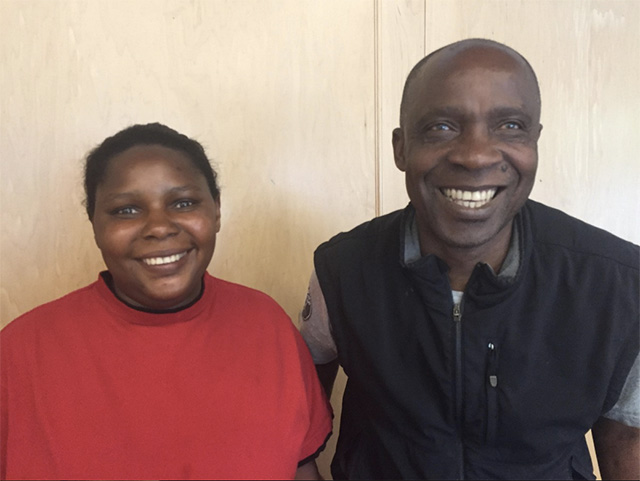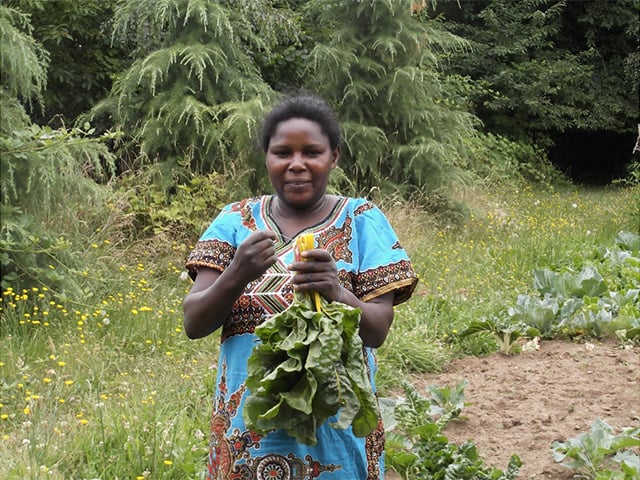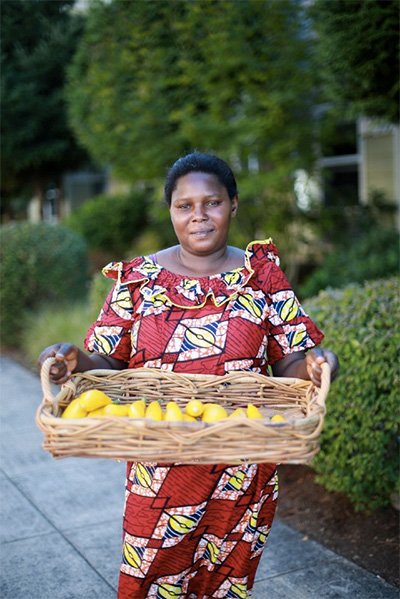Did you know that Truthout is a nonprofit and independently funded by readers like you? If you value what we do, please support our work with a donation.
The story of Rosata Hezumuryano’s Happiness Family Farm wouldn’t much matter if so many Portlanders and Oregonians weren’t so hungry.
Portlanders? Hungry? In the city the TV show Portlandia depicted as a haven for young retirees interrogating servers about local chicken?
The spot the New York Times has written myriad food stories about, using language like “foodie haven“?
Yes. One in five in Portland experiences food insecurity, federal statistics show, and as recently as 2015 the city was third nationally amongst big cities for food stamp use: 16.5%.
Last year, Oregon saw the largest spike in food insecurity of any US state, according to a report from the Oregon Center for Public Policy, based in USDA data. Sadly, the numbers are often highest for children, immigrant groups, communities of color, and refugees.
In Hezumuryano’s neighborhood — New Columbia, the state’s largest subsidized housing community — approximately 70 percent of residents are people of color, says Kris Soebroto, director of the program helping Hezumuryano, Village Gardens.
Turns out that Hezumuryano’s Happiness Family Farm project also parallels the origin story of Village Gardens itself.
The ethnically Hutu Burundi woman arrived with her husband Prosper and five children in the United States in 2009 from a refugee camp in Tanzania, where she lived “for 12 years without hope of life for all my generations,” she says. She speaks Kirundi, the official language of Burundi, and Swahili, which she uses with her interpreter, Village Gardens staffer Eca-Etabo Wasongolo, and a bit of English.
Hezumuryano’s describes her departure from Africa like this:
“There was a war in Burundi. It’s like ethnic war, conflict between Hutu and Tutsi. And the people started killing each other. So for us, we got a chance to run away. Before, we started hiding here and there, but it was too hard to hide, so we went to Tanzania, where we became refugees.”
One of the first things she did upon settling into an apartment in Beaverton, Ore. was to search, in vain, for a spot to grow her vegetables. “My family do believe in eating vegetables is protecting yourself against some illnesses,” she wrote in a brief story Village Gardens staff shared.
African eggplant and mboga buchungu, in particular, were sorely missed.
“When we came here,” Rosata said through Wasongolo, “our first impression was we can’t find anywhere where we can even have a small garden, [so] we started opening ourselves to get more land.”
“We compare what we are doing [with] back home to see that a small garden was not enough,” she said.
Soebroto says the Village Gardens program, part of Janus Youth, traces its own origins in 2001 to a similar barrier, when residents at the St. Johns Woods apartment complex (now Cathedral Gardens) started growing vegetables there, but the apartment managers “were concerned about it, and didn’t want them to do that.”
“Our work in general is about building resilience and ownership over what we do have, and creating workaround models,” Soebroto says. “The system doesn’t work for low income folk and people of color, so our work is creating models that are workarounds that do address needs.”
Since arriving in the US, Rosata and Prosper have had one additional child. Her name is Happiness.
No need is more basic than food, and food insecurity and hunger impacts immigrants and refugees more than other Americans, studies have shown.
Though still modest, Hezumuryano’s Happiness Family Farms is now helping to meet that need at New Columbia: she started with a 12×12-foot plot at the group’s “Seeds of Hope” garden, moved up to farming donated land on Sauvie Island, and now is seeking additional space to grow more. Her current customer base includes dozens of families Central African refugee-immigrant community, customers as far as Virginia and Canada, and the occasional chef or owner of a local African restaurant.

Soebroto says Hezumuryano’s and Happiness Family Farm’s success goes to the core of the mission of Village Gardens and provides “a tangible sort of path that other people can follow.”
It also suggests other things, including that the Burundian woman is amazingly adept at accessing services, and what social workers refer to as “system navigation.” Her family is currently working with Village Gardens (Janus Youth), Home Forward (the housing authority that subsidizes her public housing unit), the Valley Individual Account matched savings program, Microenterprise Services of Oregon, Oregon Department of Human Services’s Supplemental Nutrition Assistance Program (food stamps), which — ironically — still allots a paltry $7 monthly to the family, Wasongolo said.
While Hezumuryano’s family still accepts help from public sources, they are getting close to what can be a scary step: Total financial independence.
“For our first year my family decreased our expenses by 10%,” Hezumuryano said. “For the second year 15%, third 17%, and the consumption of vegetables were increased gradually for the same amount, and income increased too.”
This summer, Happiness Family Farm (named for her seventh, American-born child) is opening a new stall at the St. Johns Farmer’s Market on top of continuing to sell at the New Columbia Farmers Market. (The family’s story and the origins of Happiness Family Farms was covered by Casey Parks in the Oregonian in 2013.)
With the help of the largest matched-savings program in the nation, the innovative Valley Individual Development Account (managed by Community and Shelter Assistance Corporation of Oregon), and another local nonprofit, Microenterprise Services of Oregon, Rosata’s tiny business, which recently became a Limited Liability Corporation, will this spring obtain $8,000 to start a business account, investing in things like a greenhouse, organic fertilizer, and commercial freezers.
Its goals are wider than just making profit.
Last year, Wasongolo says, Happiness Family Farms — named for the family’s seventh child, born in the US — donated 388 pounds of fresh organic produce to St. Johns homeless, and to Central African immigrants and refugees in the New Columbia neighborhood.
The proposed cuts to the SNAP food stamp program nationally are certain to mean more hunger for 3 million US families, at the same time that the Trump administration’s proposed deportations has inspired fear and increased isolation in refugee and immigrant groups. Here in Portland, one of America’s whitest big cities, a key, first-of-its-kind 2013 study found that African refugee and immigrant groups are often “invisible” or “powerless.”
Does Hezumuryano feel invisible or powerless?
“The answer I think has two sides,” she responds. “The first is going to be yes; the second one will be not really, because we needed to start somewhere. I’m known by this community where I live, and in this community I can be open.
“The strong things start little by little.”
“I can say on my side,” Wasongolo adds, “I’m visible in this community, the New Columbia community. We have been here in this community for almost seven years.”
Is Hezumuryano afraid of the anti-immigrant sentiments and occasional blatant racism that has characterized the new administration of President Donald Trump?
“How, if we have to have a fear, where are we going to go,” she responds. “We can’t go back. Yeah, we can adapt here. If we have to have fear, where are we going to go? I think we need to work on, we have to work on our fear.”
Besides African eggplant, a big hit, a featured item at Happiness Family Farm is something called (in Swahili, the language the Congolese Wasongolo and Burundian Hezumuryano use to communicate), mboga buchungu. In a nickname that says everything about her willingness to adapt to her new country, the US citizen Hezumuryano calls it “MB Veggie.” It’s a leafy vegetable that she says has health benefits and can replace salt — no small thing considering that high sodium levels have been linked to high blood pressure, which is particularly prevalent in African-Americans.
Other organic produce sold and donated by Happiness Family Farm includes amaranth, squash leaves, beans leaves, African eggplants and other African veggies.
“I’m farming. I love it,” she says. “And this is work. So another thing again, I’m inviting people from my community if they can join me to do this work, because it’s rewarding.”
 Rosata Hezumuryano, a Burundi refugee who founded Happiness Family Farm at New Columbia, the state’s largest subsidized housing community. (Photo: Courtesy of Village Gardens)
Rosata Hezumuryano, a Burundi refugee who founded Happiness Family Farm at New Columbia, the state’s largest subsidized housing community. (Photo: Courtesy of Village Gardens)
Hezumuryano’s in the process of buying her first house with the help of Habitat for Humanity. Just as her small company’s hoped-for transition to profitability will be tough, for the African immigrant, buying a Habitat home may also bring new challenges, such as potentially leaving the New Columbia community, which Soebroto says is 70 percent persons of color.
None of this will be easy.
But for a woman who fled genocide, civil war and chaos, and lived for nine years (and had four children) in a Tanzanian refugee camp, the growth of her small business is a tale of resilience, and success.
Last year the nascent company made $3,250 from 7,000 pounds of produce last season). With a stall at a larger market this summer, Happiness could potentially double or triple that.
“We don’t feel hunger in our family,” Hezumuryano says.
For those who own extra, cultivable land, offering it to programs like Village Gardens and impoverished immigrant or refugee families is a way to make a potentially huge contribution to the community.
After starting in the Seeds of Harmony garden, the nascent Happiness Family Farm began farming a portion of a plot of land on Sauvie Island belonging to Greg and Jill Martin.
“It’s been a good experience,” Greg Martin says, noting that the Martins and another Sauvie Island family donate slightly more than an acre that is used by about five to seven Village Gardens families.
Martin is a long-time personal friend of Wasongolo, the Village Gardens staffer helping Hezumuryano, he said, and they share a Catholic faith.
“I’m a builder, I restore old houses,” Martin says. His sustainable construction and contracting business is Kaya General Contractors. After Wasongolo, originally from the Congo — which borders Hezumuryano’s Burundi in Central Africa — moved to the area, Martin adds, his Catholic parish sponsored Wasongolo and his family, moving them into a rental house Martin owned.
For five years, Wasongolo worked for Martin, who has an 11-year-old adopted daughter from Ethiopia.
A few years ago, Martin was trying to figure out what to do with a parcel of his land that was taken over by blackberries and happened to run into Wasongolo. “One thing led to another,” Martin says.
The next thing? Happiness. You can get some for yourself at the New Columbia Farmer’s Market and St. Johns Farmers Market, both of which open in June and go through the summer.
To donate to Village Gardens, a program run by Janus Youth, click here. If you have land you can donate, email [email protected].
To help Poor for a Minute survive, use Paypal & [email protected].
A terrifying moment. We appeal for your support.
In the last weeks, we have witnessed an authoritarian assault on communities in Minnesota and across the nation.
The need for truthful, grassroots reporting is urgent at this cataclysmic historical moment. Yet, Trump-aligned billionaires and other allies have taken over many legacy media outlets — the culmination of a decades-long campaign to place control of the narrative into the hands of the political right.
We refuse to let Trump’s blatant propaganda machine go unchecked. Untethered to corporate ownership or advertisers, Truthout remains fearless in our reporting and our determination to use journalism as a tool for justice.
But we need your help just to fund our basic expenses. Over 80 percent of Truthout’s funding comes from small individual donations from our community of readers, and over a third of our total budget is supported by recurring monthly donors.
Truthout has launched a fundraiser to add 500 new monthly donors in the next 10 days. Whether you can make a small monthly donation or a larger one-time gift, Truthout only works with your support.
